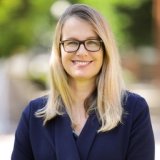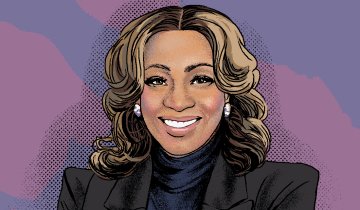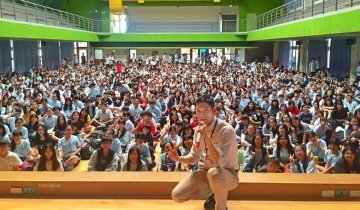Saidah Leatutufu-Burch EdD ’21, inaugural director of San Francisco’s Dream Keeper Initiative (DKI), is well on her way to “changing the way the world works.”
Part of Mayor London Breed’s response to the killing of George Floyd, the initiative is a citywide effort launched in 2021 to advance prosperity in San Francisco’s diverse Black communities. It began as a one-time reallocation of $120 million in law enforcement funding to reimagine public safety and address structural inequities, but has grown into an annual fund earmarked for Black-centered cultural spaces and programming. Last year, DKI awarded 141 grants worth $60 million.
“This is the first time that San Francisco has intentionally geared resources toward these communities,” explains Leatutufu-Burch. “It’s an acknowledgement of the historical harm that we experienced during redevelopment—the massive displacement of Black folks, the number of educational and economic disparities, as well as over-policing in the Black community.” San Francisco was once a hub of Black prosperity. In its heyday, the Fillmore District was known as the “Harlem of the West.” Recent decades, however, have seen the city’s Black population collapse—from 14% in the 1970s to under 6% today.
DKI’s mission is to promote prosperity in San Francisco’s diverse Black communities, and that’s an important adjective for Leatutufu-Burch, who “unapologetically” identifies as both Black and Samoan. “The Black community is not a monolith—we’re a megalith,” she says.
A self-described “organizer, activist and disrupter of anti-Black racism and systems rooted in White supremacist ideology,” she brings a reformer’s zeal to government service. “I enter my work every day with that mindset,” she says. “What I’m most passionate about and hopeful for is attaining Black liberation and Indigenous sovereignty in my lifetime.”
Leatutufu-Burch chose to pursue an EdD in the Organizational Change and Leadership program at USC Rossier precisely because she sees herself as a reformer. She describes the online program as “very practical” and ideal for “folks who don’t just want to think about the way the world works, but actually want to change the way the world works.”
The 33-year-old San Francisco native is the youngest child of a Hawaii-born Samoan father, a city field engineer, and an African American mother, a retired deputy sheriff. Leatutufu-Burch and her siblings grew up economically poor, living in North Beach public housing. A first-generation student, she earned her bachelor’s in political science at the University of San Francisco in 2011, and her master of public administration at San Francisco State in 2015.
Her new role spearheading DKI grew from a USC Rossier connection. Leatutufu-Burch was recruited for the inaugural directorship by Sheryl Evans Davis EdD ’21, who is executive director of the San Francisco Human Rights Commission, the city department that houses DKI.
The two women bonded as classmates, and Davis joined a network of mentors who were templates for Leatutufu-Burch’s dissertation, “The Rich Auntie Effect.” Written under the advisement of USC Rossier professors Helena Seli and Monique Datta as well as Joshua Berger, former director of the Belldegrun Center for Innovative Leadership at Brentwood School, Leatutufu-Burch focused on mentorships that spur socioeconomic advancement in young people of color and the idea “that wealth is not solely associated with economics, but should be viewed holistically.” Social networks, educational capital, familial capital, cultural capital, actual income, political capital and access to mentorships can all produce wealth, she argues.
Her work with DKI embodies that philosophy, though it hasn’t been smooth sailing. The program is staffed by 28 city employees across nine departments, only eight of whom directly report to Leatutufu-Burch. After 10 months on the job, Leatutufu-Burch describes the atmosphere as “tropical, and by that I mean there’s no shortage of storms. But when it works, it is beautiful.”
Among the beautiful outcomes, she points to a 360% uptick in Black homeownership through city-funded programs and dozens of new Black-owned businesses. “There’s still much further to go, and we continue to experience the storms,” she says. “But there are moments when the storm subsides, and we bask in that beauty.”





